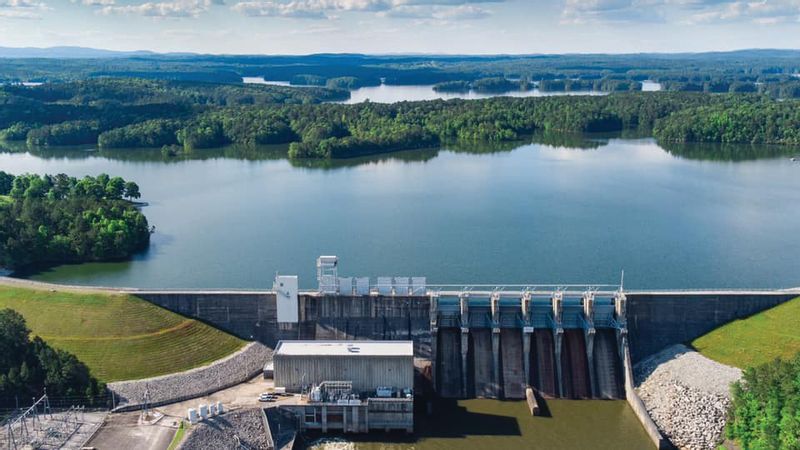Rules of the Lake

Do I need a fishing license?
Alabama RESIDENTS and NON-RESIDENTS age 16 and older are required to have appropriate recreational licenses to fish in public waters. The fishing license year is from September 1 to August 31 every year.
- Determine if you qualify for RESIDENT or NON-RESIDENT fishing license privileges. You may purchase RESIDENT fishing licenses if you have a valid Alabama driver's license or valid Alabama non-driver's ID card and have resided continuously in Alabama for 90 days and have a Social Security number.
- Decide which RESIDENT or NON-RESIDENT fishing license(s) you want to purchase.
Examples include the Annual Fishing License, an Annual Public Fishing Lakes License, a 3-Day Family License.
3. Have your information and documentation ready.
- Name
- Date of birth (BOB)
- Address
- Driver's License, ID, or passport number
- Social Security Number (U.S. Residents)
- Form of Payment
4. Complete the application.
Complete in person at the Randolph County Probate Office, or complete online with Outdoor Alabama.
Do I Need to Register My Boat?
Boating Registrations
Alabama Law Enforcement says yes, and that when you apply for your boat registration, you will have to pay a registration fee. The amount of the registration fee will depend on the length of the boat you are registering. Registration fees are collected to help contribute to the maintenance and conservation of state waterways. Find more information at www.alea.gov.
In Randolph County the Probate Office will process your boat registration.
| Last Name Begins With | Renewal Month |
| A & D | January |
| B | February |
| C & E | March |
| F, G, & N | April |
| H & O | May |
| M & I | June |
| P & L | July |
| J, K, & R | August |
| Q, S, & T | September |
U, V, W, X, Y & Z and all registered under company names. All dealers and liveries | October |
How Do I Get a Boating License?
According to Alabama Law Enforcement, no one under the age of 12 years may operate any motorized vessel ( including personal watercraft, such as a sea doo, waverunner, jetski, etc.) on Alabama's waterways.
License requirements for those who do not reside in Alabama:
Non-residents 12 years and older, may operate on Alabama waters up to 45 days per calendar year without having to obtain a vessel operator's license. Non-residents who have obtained a vessel certification or license from their home state may use that in lieu of the Alabama Non-Resident Vessel Operator's License. HOWEVER: Non-resident vessel operators 12 or 13 years old, can only operate if there is someone 21 years old or older on board, who either has a valid vessel operator's license in possession or falls under the 45-day exemption period because of non-residency status, and who is seated in a position to take immediate control of the vessel if necessary.
License requirements for Alabama residents:
- Operators 12 or 13 years old, after obtaining the vessel operator's license, can only operate if there is someone 21 years old or older on board, who also has a vessel operator's license in possession, and is seated in a position to take immediate control of the vessel if necessary.
- Operators 14 years old and older, after obtaining the vessel operator's license, may legally operate without supervision.
NOTE: The operator certification/license must be in possession at the time of operation. In other words, keep that license with you on your watercraft! Your marine patrol friends will ask for it when they see you out there.
How to Obtain Boat Operators License:
- Applicants go to the Department of Public Safety Driver's License Examining Office in their county of residence.
- Make an application and pay the appropriate fee ($5).
- Answer medical questions.
- Successfully complete written/oral exam or show proof of exemption ( boating course certificate of completion or age exemption). This can be done online at https://www.boat-ed.com/alabama/ or in person when offered, often at Wedowee Marine South.
- Take the proper form to an ALEA driver license exam office to have the "V" class placed on the driver' license.
Cost: A one-time application fee of $5.00 cash and a $36.25 issuance fee for the license.
Wake Surf Law
(From Summer in Review 2023)
The areas on Lake Wedowee where a boater can legally wake-surf or wakeboard have been drastically reduced as of September 1,2023, according to a new law that was signed into law by Gov. Kay Ivey in June. Legislative Act 2023-459, formerly known as HB422, aims to regulate and/or prohibit wakeboarding and wake surfing under certain conditions on Smith Lake, Lake Wedowee, and a section of Shoals Creek in Lauderdale County. According to the legislation, the definition of wake and wake surfing includes both the operator and the rider regardless of whether the person on the board is being towed across the wake or surfing the wake, and regardless of whether the board and rider is being pulled by a tow line.
A person may not engage in wakeboarding or wake surfing under any of the following conditions:
- Between sunset and sunrise
- On any portion of the impounded waters where the width of the portion is less than 400 feet
- Within 200 feet from any shoreline, dock, pier, boathouse, or other structure located on the impounded waters
- When not wearing a personal floatation device approved by the United States Coast Guard.
Other states across the Southeast have passed similar laws regarding wakeboarding and wake surfing. Georgia's law, which applies to all state waters, went into effect July , while South Carolina and Tennessee both passed laws in 2022. All four have been based on a model act drafted by the Watersports Industry Association (WISA). According to its website, "WISA is the towed water sports industry's leading advocate, known for preserving the vitality of our activities long into the future. As a group, we develop best practices, maintain waterway access rights, educate participants, promote safety and facilitate sustainable industry growth." The group launched the Wake Responsibly campaign in 2022 as an effort to educate people on the best practices of wakeboarding and wake surfing.
They include:
- Minimize Repetitive Passes
- Keep Music at a Responsible Level
- Stay a Least 200 Feet Away
There is a grace period of sorts for first offenses for one year from the effective date, however, second or subsequent offenses within the first year will be treated like a first offense with regard to penalties. Penalties for a first offense are a fine of no less than one-hundred dollars ($100). "We plan to educate the public using news media, social media outlets and all avenues of public boater safety education that we have available to us, including our Boat Alabama boating safety courses taught by Troopers," Deputy Chief Matt Brooks, ALEAMarine Patrol Division, said.
"As with most laws, there will be a transition and adaptation period for both the public and law enforcement. We will exercise patience and ask for patience in return. This will be just one of many boating safety laws and regulations that our Troopers will enforce." Brooks went on to say, "When ALEA stops a vessel for a violation of this law, they will use a combination of enforcement and education with operators we stop to bring awareness to the law and issues. We will respond to and handle complaints as we receive them," Brooks said.
"The public can reach the nearest Trooper dispatch center by calling *HP or *47 on their cell phones. Of course, 911 can be called in any emergency situation."
To learn more about Wake Responsibly, visit https://www.wakeresponsibly.com/
LWPOA Boater Safety Tips
- Wake Surfing and wakeboarding are prohibited within 200 feet of shore, docks, or other structures
- Children 8 and under must wear a lifejacket
- Number of lifejackets present onboard must equal number of passengers
- Passengers seated on the rear or deck of the boat can cause the driver to be ticketed
- Please follow 5 mph wake zone signs
- Stay seated while the boat is moving
- Carbon monoxide from the rear of the boat is deadly
- Drive on the right, same as a car, especially when the lake is busy
- Never follow a boat towing a skier or tuber too closely. They may fall off into your path
- Running lights, including anchor light, must be visible from sunset to sunrise
- Boating under the influence (BUI) of alcohol or drugs is illegal and dangerous

Lake Wedowee Life magazine
104 W Broad Street
Wedowee, AL 36278
(256) 357-4557
www.LakeWedoweeLife.com
